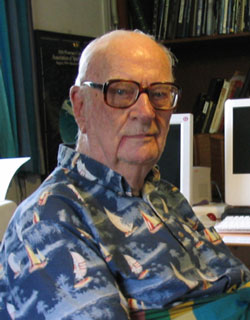Death of a guru
Sci-fi writer leaves a legacy … but what?

Recently, news reports told of the death of the hugely popular science fiction writer Sir Arthur C. Clarke (1917–2008). So famous is Clarke—the author of some 80 books—that his popularity extended into many non-English speaking countries. This demonstrates the enormous popularity of science-fiction as it carries universal themes such as the hope and vision of a more ‘enlightened’ and peaceful future. Indeed, one of Clarke’s enduring themes was for a world free of religious ideology, and he saw creationists, in particular, as irrational bigots, and they often came in for criticism from him. He once said:
‘I have encountered a few creationists and because they were usually nice, intelligent people, I have been unable to decide whether they were really mad, or only pretending to be mad. If I was a religious person, I would consider creationism nothing less than blasphemy. Do its adherents imagine that God is a cosmic hoaxer who has created that whole vast fossil record for the sole purpose of misleading mankind?’1
As brilliant as he may have been regarded by his legion of fans, this demonstrates that he held to no more than an ignorant parody of what creationists actually believe. In short, he is really saying that anyone who believes in creation is stupid. For such a talented man this comment was really a poor show. I am certainly not trying to disparage Clarke on the event of his untimely death, but the blogs are already lauding his legacy. I am trying to highlight that Clarke’s own disparaging words about creationists will no doubt be rolled out and taken as ‘gospel’, as he is eulogized all over the world due to many being swept up in the tide of emotion.
Clarke’s comment about the fossil record was unfortunately ‘willingly ignorant’ (2 Peter 3:5) about what the fossil layers actually represent from a creationist perspective. The overwhelming evidence of catastrophically formed geologic, fossil-bearing layers is a key to understanding a Christian’s Bible-centered worldview. Clarke was not alone in his ignorance. Many are very surprised to discover that Christians actually have answers to such non-existent problems. Not bothering to find out what people really believe before criticizing them is really a form of bigotry in itself—the very thing Clarke accuses Christians of.
Why so popular?
Arthur C. Clarke was regarded as one of the ‘big 3’ in science fiction along with Robert A. Heinlein and Isaac Asimov. Asimov and Clarke are two of the most influential authors of our time, and I don’t just mean in science fiction. Clarke’s writings have had a major influence on people’s thinking particularly as to whether we are alone in the universe. In interviews, Clarke consistently expressed his wish for evidence of extraterrestrial life. A comment from a devotee’s website said:

‘At the heart of every Arthur C. Clarke novel lies a small puzzle with large ramifications. He is an author who takes an idea and drops it into a quiet pool of thought. There’s a splash—that’s the intriguing nature of Clarke’s scientific genius … He’s a science fiction writer whose imaginings reverberate outside the realm of fiction.’2
Whether in movies or in print, sci-fi is unquestionably the most popular entertainment genre of today, and many devotees aspire to the ideals of their sci-fi authors whom they often regard as visionaries. His most well-known work was the movie 2001: A Space Odyssey (1968). This movie (which he co-wrote with famous movie director Stanley Kubrick) was based upon Clarke’s short story The Sentinel. Later, Clarke wrote a followup to 2001 called 2010: Odyssey Two, which was also produced as the movie 2010: The Year We Make Contact. Both movies presented an antibiblical view of man’s origins. It was the idea that intelligent aliens, who must have evolved elsewhere, had seeded evolution on earth, and were somehow engineering or overseeing it for millions of years. The former idea is known as ‘directed panspermia’, and it, often along with the ‘overseeing’ notion, is an increasingly popular view among scientists and laypeople alike, in the main due to the complex information discovered in the DNA molecule of every living creature (see Designed by aliens) that could not have evolved by chance.
Of course, this begs the problem of who created our alien creators, and in turn, the creator of the creators and so on? These are materialistic notions that life must be evolving all over the universe and must also be at different stages of evolution. And because there is also a concomitant view that the universe is billions of years old, then some alien races are presumed to be more advanced, or some less so, and thus, more primitive at any given time.
One of the allures of science fiction is that it taps into mankind’s fascination with the future. Clarke was most certainly a futurist and an avid inventor. His prediction of a moon landing before the year 2000 was dismissed as nonsense when it was made back in the 1940s.
‘When Neil Armstrong landed in 1969, the United States said that Clarke “provided the intellectual drive that led us to the moon.”’3

His most famous prediction was the concept of satellites that now orbit our planet. Prior to satellites, radio transmissions had a ‘line of sight’ problem as few bandwidths of radio waves could be sent around the curvature of the earth with reliable consistency (see Created to spread the Gospel). Satellites are now used as transmitters for radio and television signals as they are beamed up and then back down to numerous locations. He made this prediction back in 1945, long before the first space launch, and because of this foresight, he is known as the father of modern satellites. Due to the incredible impact of satellites on our everyday lives, Sir Arthur C. Clarke has been held in almost God-like status by many. He also predicted that giant space elevators will be built that would reach from the ground to space stations orbiting above. Patrick Moore, the renowned British astronomer and fellow atheistic anticreationist said, upon hearing of Clarke’s death:
‘He was ahead of his time in so many ways, … . Quite apart from artificial satellites there were other things too. A great science fiction writer, a very good scientist, a great prophet and a very dear friend, I’m very, very sad that he’s gone.’4
Moore has unwittingly stated why such science fiction writers are held in great esteem. Futurism has religious significance for just about everyone. As Christians we also believe what we believe, in some part, because of the hope for a better future—an eternal paradise—with no more sin and death. For those with no religious affiliation, such sci-fi writers and scientists have become modern-day prophets, and science has become mankind’s ‘god’. I and many other Christians enjoy science fiction but understand that it is mere fiction/fantasy because of our Christian worldview filter. Unfortunately, most science fiction today deals with the concept of extraterrestrial life, and therefore it reinforces the notion that evolution must be true.
Clarke’s wish for a peaceful future had the unrealistic premise of having a world free of religion where there would be no intolerance of other people’s views. Unfortunately, such a view is idealistic in the extreme and quite frankly impossible. Evolutionary-centered atheism provides no ultimate moral basis for right and wrong, so the likelihood of conflict is only increased under this scenario. Indeed, the greatest mass murderers in the whole of human history had a godless view of our existence. Man was nothing more than an evolved animal that could be killed for the greater good, as long as you had the power to impose your definition of ‘good’. So much for tolerance!
It is a sad legacy
But Clarke was indeed religious in the same way that most evolutionists are religious. Early in his life he explored the paranormal and the metaphysical, and it is believed that this influenced his novel Childhood’s End. He also admitted being taken in by infamous ‘spoon-bender’ Uri Geller’s demonstrations.5 Although he distanced himself from this later in his life, he still advocated research into telekinesis.
We need to remember that atheism, by definition, is actually a religious view. The word ‘religion’ comes from the Latin religare (re: back, ligare: to bind), expressing the idea that one is ‘bound’ to one’s beliefs, which guide all of one’s actions. Religion can therefore include the belief that there is no supernatural realm.6
Sir Arthur has left specific written instructions that his funeral is to be strictly secular:
‘Absolutely no religious rites of any kind, relating to any religious faith, should be associated with my funeral.’7
Even in his death, Clarke tries to be an example for a totally man-centered worldview, which, sadly, will ultimately lead many to a godless eternity. The Bible tells us that man was made in the image of the eternal God, but is afflicted by sin. Left to our own devices, destruction usually follows. History has repeatedly shown this to be true. Man does not learn from history very well because our sin nature with its selfish desires ultimately takes over.
The Good News though is that God recognized our inability to help ourselves. Because of His love for human beings that He created, He sent His One and only Son to die in our place—for our sins.
In the truest sense Sir Arthur C. Clarke was not a prophet. He was in error about some of his predictions and time will tell if others come to pass. A true prophet is one who receives information from God about the future. The prophet’s predictions are always 100% accurate because the information comes from God who inhabits eternity, where there is no time. It’s not surprising therefore that God can tell the future. Only the Creator as shown in the book of Genesis can have the power to save us. Idealistic hopes provide an uncertain future, but the Creator makes a promise that I personally know very well.
‘But for that very reason I was shown mercy so that in me, the worst of sinners, Christ Jesus might display his unlimited patience as an example for those who would believe on him and receive eternal life’ (1 Timothy 1:16).
References
- Rational Atheist [biography of Arthur C. Clarke], 19 March 2008. Return to text.
- Arthur C. Clarke Unauthorized Homepage,www.lsi.usp.br/~rbianchi/clarke/ACC.Homepage.html, last accessed February 12, 2003. Return to text.
- Sci-fi guru Arthur C Clarke dies, 20 March 2008. Return to text.
- Sci-fi guru Clarke dies in Sri Lanka, http://afp.google.com/article/ALeqM5iuw_qAhr33lVGN2DicffN7EESHzg, 19 March 2008. Return to text.
- Arthur C. Clarke, 20 March 2008. Return to text.
- Bates, G., Alien Intrusion: UFOs and the Evolution Connection, Master Books, Green Forest, Arizona, 2005, p. 60. Return to text.
- Ref. 3. Return to text.

Readers’ comments
Comments are automatically closed 14 days after publication.